Key takeaways:
- Musical genres provide insight into culture, history, and personal emotions, allowing listeners to connect deeply with music.
- Each genre has distinct characteristics that evoke specific feelings; for example, rock embodies rebellion, while jazz emphasizes improvisation and connection.
- Genres significantly influence mood, with classical music promoting calm, pop uplifting spirits, and folk fostering warmth and storytelling.
- Exploring new musical genres enhances personal taste and connections, enabling experiences that enrich emotional understanding and creativity.
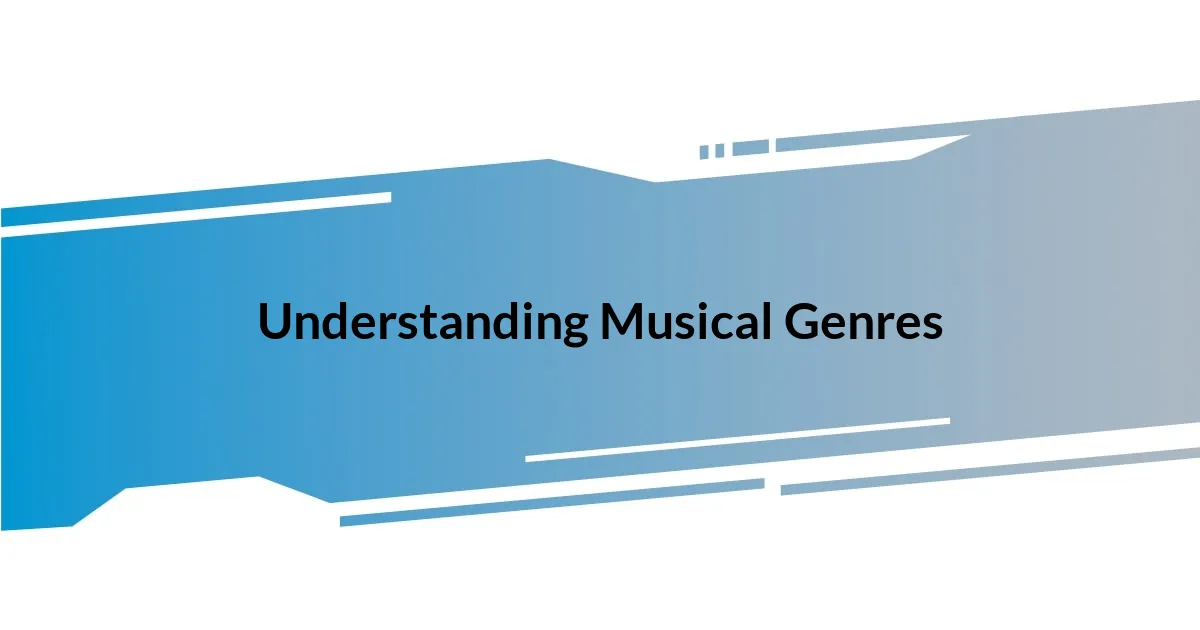
Understanding Musical Genres
Musical genres are fascinating categories that help us navigate the vast world of music. Think about your favorite songs—how often do you gravitate towards a specific style that resonates with your emotions? For me, discovering genres like jazz or indie rock felt like unveiling a treasure chest filled with unique sounds!
Each genre tells a story about culture, history, and personal experience. I remember the first time I listened to classical music; it was a transformative moment. I felt a sense of timelessness as if I were connecting with composers from centuries past. How do you feel when a particular song transports you to a different time or place?
Understanding musical genres goes beyond mere categorization. It opens doors to exploring the depth of human emotion and expression. When I hear folk music, I often feel a sense of nostalgia for stories of resilience and love. Isn’t it incredible how a simple melody can evoke such powerful memories and feelings?
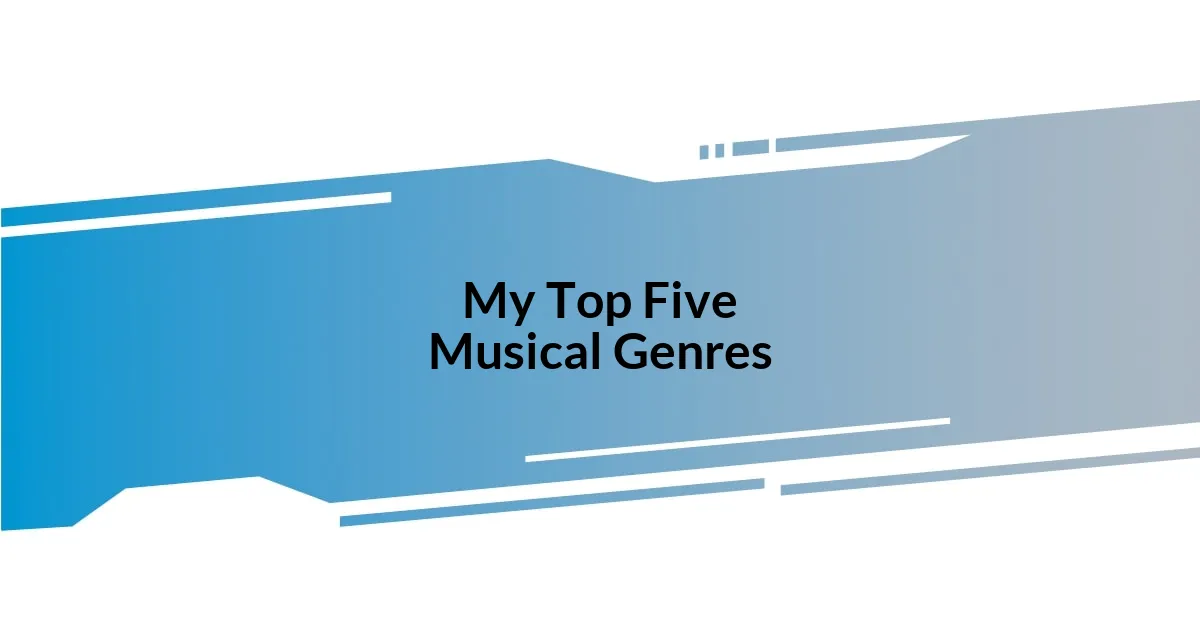
My Top Five Musical Genres
When I think about my top five musical genres, I can’t help but reflect on how each one resonates with different experiences in my life. Rock music takes me back to my teenage years, where I first discovered energy and rebellion through powerful guitar riffs. I remember blasting my favorite tracks while driving down winding roads, feeling like I was on top of the world. It’s that raw emotion that makes rock such a vital part of my musical journey.
Then there’s jazz, which wraps around me like a warm blanket. I cherish evenings spent in dimly lit jazz bars, sipping on a drink while letting the smooth melodies wash over me. I once attended an impromptu performance, where the musicians played as if they were having a conversation with each other. That moment truly showcased the improvisational beauty of jazz, reminding me of how music can forge connections beyond words.
Folk music holds a special place in my heart, too. It resonates with my love for storytelling and simplicity. I often find comfort in songs that recount tales of love and struggle. Listening to folk music feels like sitting around a campfire, sharing stories with friends, evoking a sense of belonging and shared experience. Each of these genres uniquely shapes my musical world and reflects my memories and emotions.
| Genre | Why I Love It |
|---|---|
| Rock | Captures youthful energy and rebellion. |
| Jazz | Fosters connection through improvisation. |
| Folk | Evokes storytelling and a sense of belonging. |
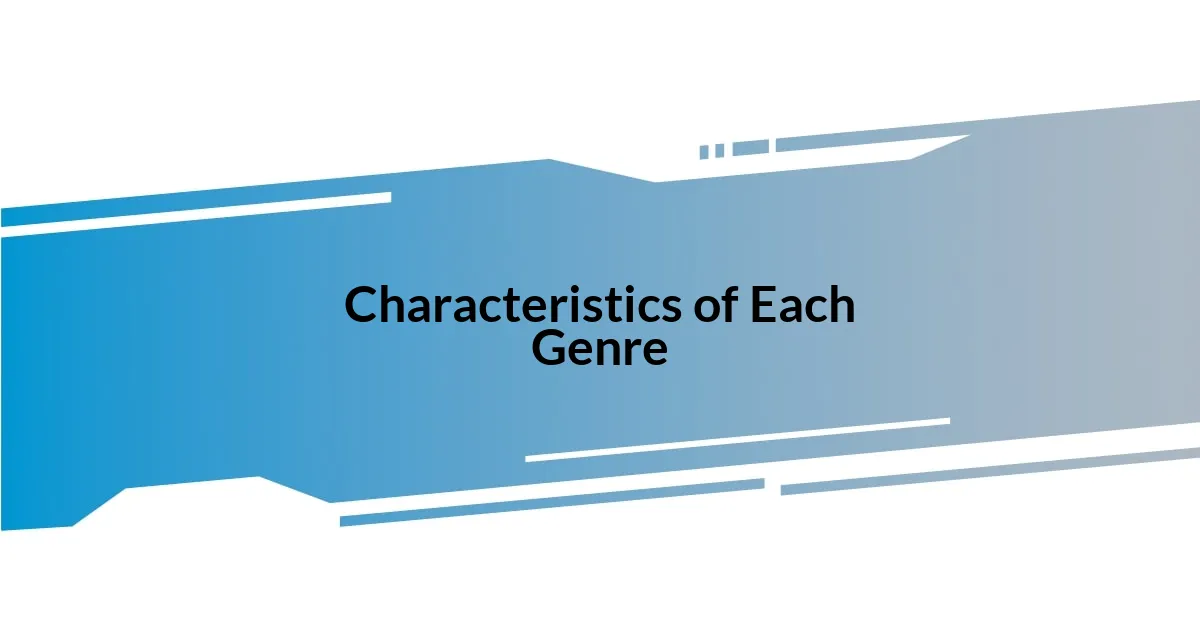
Characteristics of Each Genre
The distinct characteristics of each genre truly shape the listener’s experience. For instance, rock music often features strong guitar riffs and powerful vocals that can stir feelings of rebellion and freedom. I vividly recall attending a local rock concert, where the energy was palpable, and everyone around me sang along with such fervor that it felt like one big, united voice. It’s this raw power that gives rock its edge and keeps it alive across generations.
- Rock: Strong guitar riffs, powerful vocals.
- Jazz: Complex harmonies, syncopated rhythms, improvisational nature.
- Folk: Simple melodies, storytelling lyrics, acoustic instrumentation.
Jazz, with its intricate chords and smooth instrumental solos, stands out for its unpredictability and conversation-like exchanges between musicians. One night, while sitting in a small club, a saxophonist played a solo that seemed to tell an entire story of love lost and found. Those moments of spontaneity create a unique connection between the artist and the audience, allowing everyone to feel the depth of emotion that jazz encapsulates.
- Classical: Orchestral arrangements, emotional depth, structured compositions.
- Indie Rock: Unique sounds, lyrical introspection, often DIY ethos.
As for folk, it’s all about connection through storytelling. I can still picture gathering around a fire with friends, strumming a guitar, and sharing tales inspired by the songs. Folk music’s simplicity invokes a warmth that wraps around you, making you feel at home even in the most unfamiliar settings. Its narratives often linger long after the music fades, connecting listeners through shared experiences and emotions.
- Pop: Catchy hooks, relatable lyrics, widespread appeal.
- Electronic: Synthesized sounds, beats that drive movement, trend-setting rhythms.
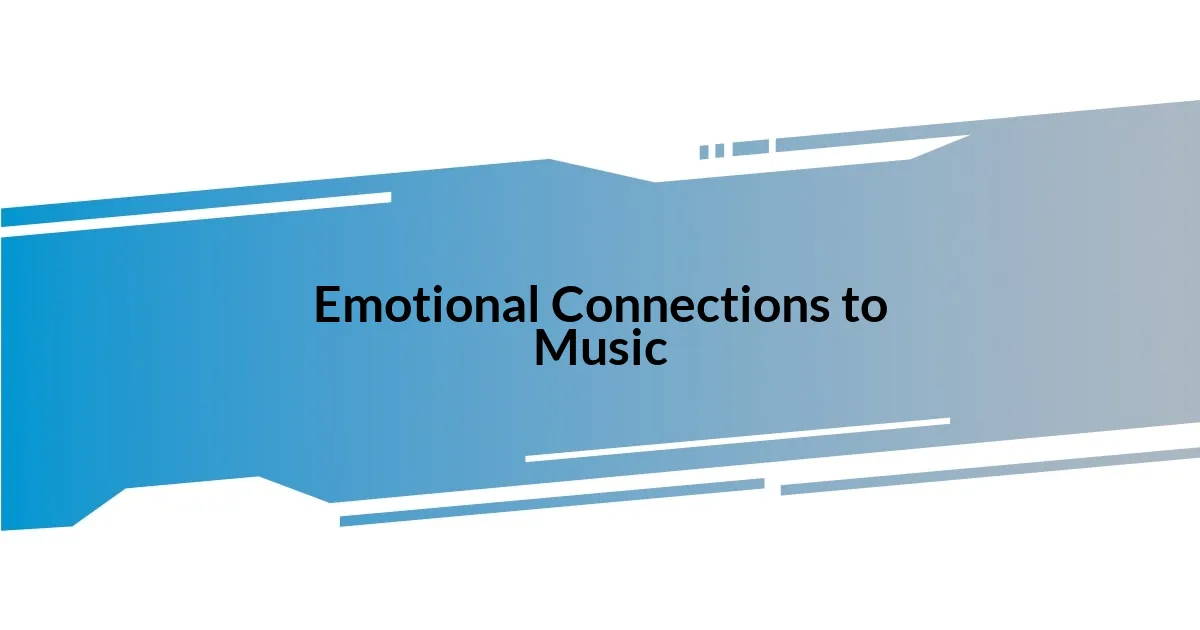
Emotional Connections to Music
There’s something profoundly personal about the emotional connections we form with music. Have you ever heard a song that instantly transported you back to a specific moment? I certainly have. For me, it was a ballad that played in the background during a rainy afternoon of reflection. That simple melody connected me to feelings of nostalgia and introspection, reminding me of my journey and the moments that shaped who I am.
When I listen to certain tracks, I can almost feel the emotions just pouring out. For instance, I recall standing in my kitchen, cooking while a powerful anthem blasted from my speakers. The chorus hit me, resonating my inner strength, pushing me to embrace challenges. It’s moments like these that prove how music can serve as a catalyst for self-discovery and emotional release. It’s more than just sound; it’s a reminder that we’re not alone in our experiences.
Have you ever found solace in lyrics that seem to speak directly to you? I remember discovering a poignant verse that addressed heartbreak, and it felt like the artist was narrating my own story. Music has that unique power to articulate our feelings, allowing us to process them in ways that sometimes words alone can’t. In these instances, I often feel seen and understood, bridging the gap between my experiences and those of others through shared melodies and sentiments.
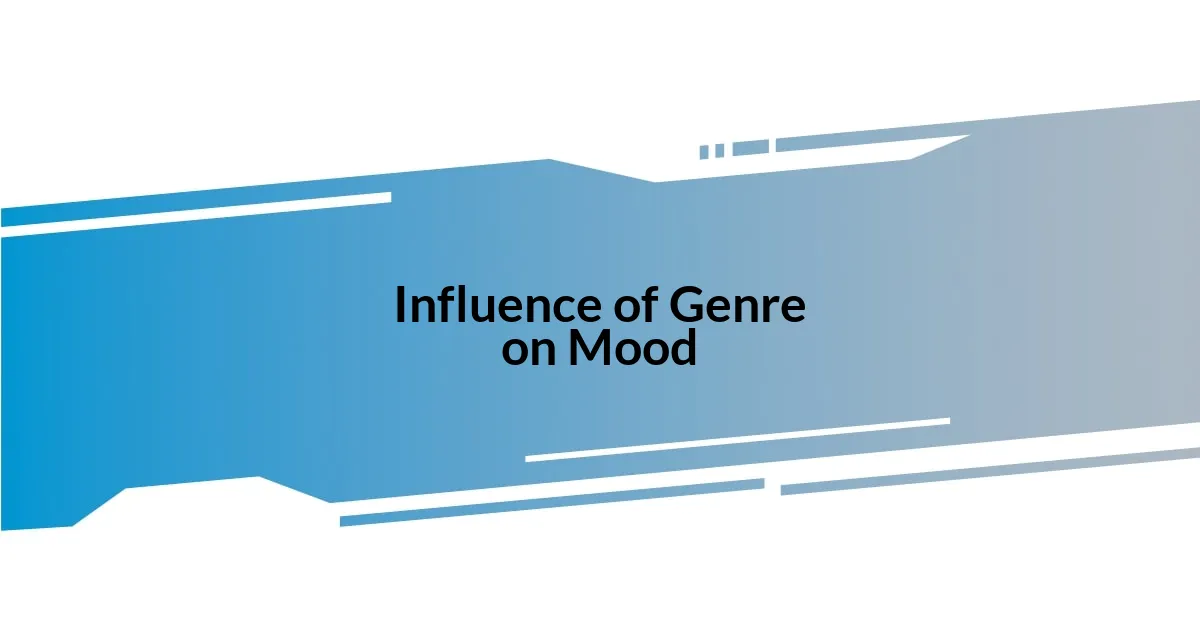
Influence of Genre on Mood
The relationship between music genres and mood is fascinating. I’ve often found that listening to classical music can elevate my emotions, swaying me toward a peaceful state. For instance, one evening I put on a symphony while winding down, and the sweeping strings transported me to a tranquil place, easing the day’s stresses away. It’s amazing how the orchestral arrangements can evoke such profound feelings of calm.
On the flip side, there are times when only upbeat pop tracks can really turn my mood around. I vividly recall a morning when I was dragging myself out of bed, feeling uninspired and weary. A catchy pop anthem started playing, and just within a few minutes, my whole outlook brightened. The infectious energy of those beats sparked a motivation in me that I never expected. Isn’t it incredible how something as simple as a song can shift your mindset in an instant?
Then there’s my personal connection with folk music, which often feels like a warm hug. One late-night drive, I played a folk singer-songwriter’s album that was filled with heartfelt stories of love and loss. The gentle acoustic strumming and sincere lyrics wrapped around me like a comforting blanket. Those narratives made me reflect on my own experiences, solidifying how genre shapes not just our surroundings, but our internal dialogue as well. How often do you find music deeply resonating with your own life stories?
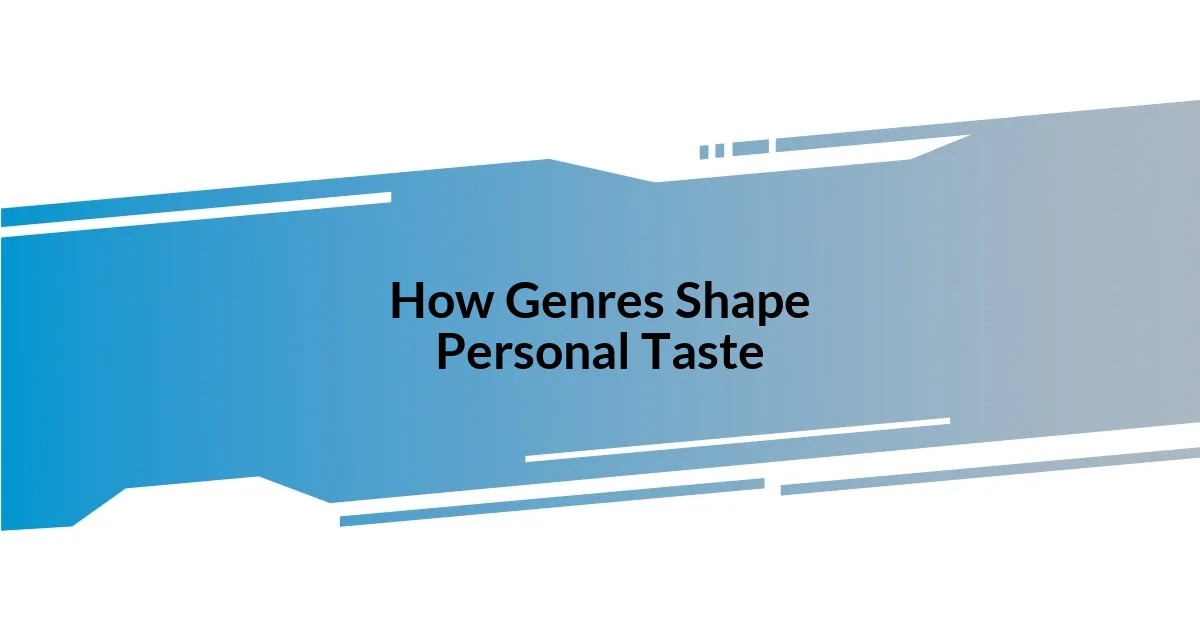
How Genres Shape Personal Taste
Music genres play a crucial role in shaping our personal tastes and preferences. I remember the first time I was introduced to jazz. Sitting in a cozy coffee shop, the smooth melodies captivated me, creating a warm atmosphere that instantly felt like home. I started exploring artists like Miles Davis and John Coltrane, and I discovered how their improvisational style reflects an unpredictability that I value in life.
With country music, I often find myself connecting deeply to its storytelling. There’s something about the raw honesty in lyrics about heartache and love that hooks me every time. I once attended a live performance where the artist shared his personal experiences behind each song. That transparency made me appreciate country music on a different level, highlighting the genre’s ability to weave personal narratives that mirror our own struggles and triumphs. Have you ever felt like a song perfectly narrated your life?
In contrast, electronic music often serves as my escape. When I attend festivals, surrounded by the pulsating beats and vibrant lights, I feel a sense of liberation. Each drop seems to shake me free from daily stresses, allowing me to lose myself in the rhythm. I often wonder, how can something so abstract evoke such powerful sensations? This contrast in genres not only shapes my listening habits but also influences how I relate to my emotions and experiences.
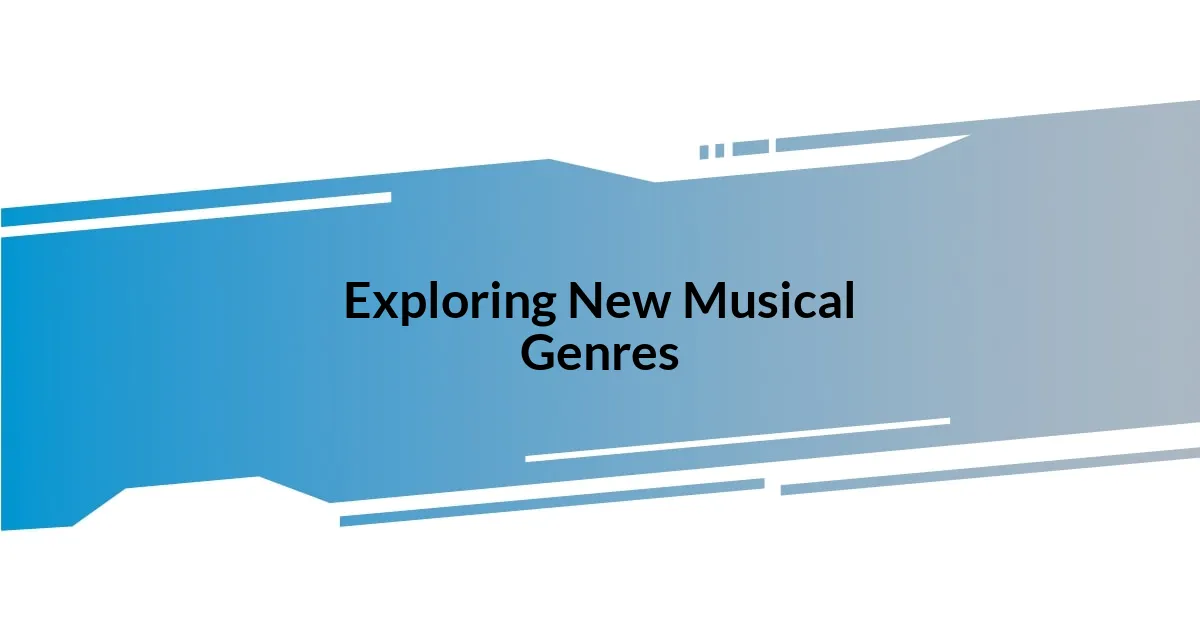
Exploring New Musical Genres
Exploring new musical genres is like embarking on an adventure with every play button I hit. I vividly recall the first time I stumbled upon bossa nova; the gentle sway of the rhythms enchanted me instantly. While lounging on my terrace one summer evening, I turned on João Gilberto’s “Chega de Saudade.” The soft melody fused with the sunset colors and transported me to a serene Brazilian beach. Have you ever experienced music so blissful that it completely altered your surroundings?
As I delve into world music, I embrace a whole palette of sounds and stories from different cultures. Recently, while diving into traditional African drumming, I found it nearly impossible to resist tapping my feet. One afternoon, as I listened to the beat of the djembe, the vibrant energy jolted me to my core and sparked inspiration for a painting I was working on. Isn’t it fascinating how something as rhythmic as drumming can unlock our creativity and enhance our understanding of diverse traditions?
I’ve also discovered the thrill of mixing genres; combining rock with reggae, for example, opened up a whole new musical world. I still remember a casual jam session with friends when we played a rendition of a classic rock song infused with reggae vibes. The infectious groovy twist took everyone by surprise and elevated our spirits. Don’t you think this adventurous fusion can lead to unexpected moments of joy and connection? Trying out new styles has the power to enrich our experiences and bring us closer together through shared musical journeys.